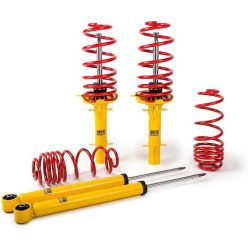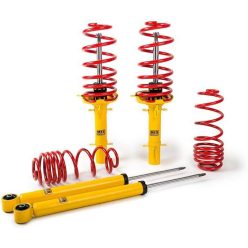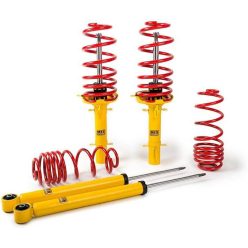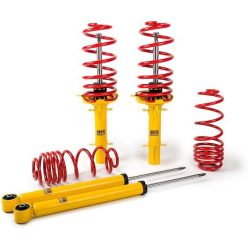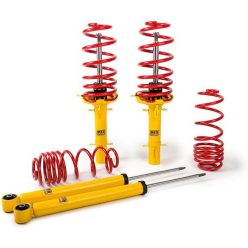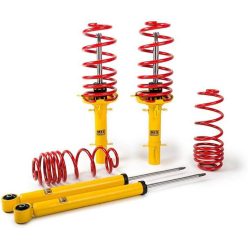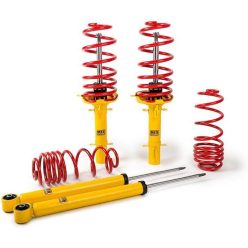The SEAT – MTS Technik Suspension Kits category covers fixed-height Suspension Lowering Kit sport packages for SEAT models such as Ibiza and Cordoba on VW group platforms. Matched lowering springs and sport dampers typically provide 30/30 mm moderate and 60/40 mm more aggressive drops, depending on application. These spring–damper combinations reduce body roll, improve cornering stability and sharpen steering response while keeping the car usable on real roads.
Net price: 386 €
Net price: 386 €
Net price: 383 €
Net price: 415 €
Net price: 415 €
Net price: 410 €
Net price: 389 €
Net price: 389 €
Net price: 415 €
Net price: 415 €
Net price: 344 €
Net price: 344 €
SEAT platforms – sportier stance with MTS Technik suspension kits
SEAT – MTS Technik Suspension Kits bring complete sport suspension kits to popular SEAT models such as Ibiza II and Cordoba on shared VW platforms. Each Suspension Lowering Kit consists of fixed-drop springs and matching sport shock absorbers tuned for a specific chassis. European application data show options like 30/30 mm for fast-road setups and 60/40 mm for more aggressive stances, giving owners freedom to choose between subtle and eye-catching lowering.
MTS Technik designs its kits as holistic solutions rather than a random combination of parts. The aim is to replace the stock suspension’s soft, tall feel with a firmer, more controlled ride while avoiding uncomfortably harsh behaviour. On nimble SEAT models, a well-tuned sport suspension reduces pitch and roll, improves stability in quick direction changes and makes the steering feel more direct. At the same time, practical ground clearance and usable travel are preserved if you choose a sensible drop for your roads.
Technical Basics
MTS Technik sport suspension kits are based on cold-formed chromium–silicon steel springs with tight tolerances and robust anti-corrosion protection via chemical treatment and powder coating. Shortened sport dampers are gas-charged and filled with heat-stable oil; their valving is tailored to the higher spring rates and reduced travel. This combination produces a firm yet predictable response, avoiding the uncontrolled bouncing that can occur when lowering springs are used with stock shocks.
For SEAT Cordoba (6K1/6K2) and similar models, European catalogues show kits with both moderate 30/30 mm and more aggressive 60/40 mm drops. These values are chosen to noticeably improve body control and stance without permanently riding on bump stops. On shared VW platforms, MTS uses factory axle-load data and suspension geometries as its baseline, so each kit keeps the car working within its intended travel range while delivering the advertised lowering.
Selection Criteria
Choosing a SEAT – MTS Technik Suspension Kit starts with identifying your car precisely: Ibiza or Cordoba, generation (for example 6K1/6K2), body style and engine. Different variants have different axle-load ranges, so selection must be made using MTS application lists and product codes, not just model names. Incorrect selection can cause unexpected ride heights and damping behaviour that falls outside the intended tuning window.
Next, decide how much lowering you want. Around 30/30 mm is an excellent compromise for road cars, providing a clearly sportier stance and tighter body control while preserving reasonable comfort and clearance. Drops around 60/40 mm give a more dramatic look and firmer behaviour but reduce ground clearance and increase the likelihood of scraping exhausts, lips or underbody components. For daily-driven SEATs, moderate drops usually offer the best balance of style, performance and practicality.
Wheel and tyre choices strongly influence the final result. Wider tyres, lower offsets or spacers bring the wheel closer to fender lips and arch liners, especially with larger drops. Once ride height is set, you should carefully check clearance at full steering lock and through full suspension travel with realistic passenger and luggage loads. On a road car, maintaining a small safety margin is wiser than running extremely low and dealing with constant rubbing and damage.
Installation & Maintenance
Installing MTS Technik suspension kits on SEAT models is a safety-critical job that should be carried out by an experienced workshop. Correct use of spring compressors, secure support for suspension arms and torqueing all fixings to factory specifications are essential. During installation, top mounts, ball joints, bushes and dust boots should be inspected and replaced if worn so that new components are not compromised by tired surrounding hardware.
After the first shakedown drive, re-torque critical fasteners and perform a four-wheel alignment, as lowering alters geometry. Long-term maintenance involves monitoring for damper oil leaks, chipped spring coating and general wear in suspension components. If the car is driven enthusiastically or taken to track days, at least annual inspections by a suspension specialist are recommended to preserve performance and safety.
FAQ
Which SEAT models are covered by MTS Technik kits?
Applications are primarily available for Ibiza and Cordoba generations on shared VW platforms, with additional coverage for related models in some catalogues. Always refer to the product application list for exact fitment.
What lowering amounts are typical for SEAT MTS kits?
Most kits offer moderate 30/30 mm and more aggressive 60/40 mm drops, depending on the model and engine. Exact figures are provided on each product page.
Are these kits suitable for daily driving?
Yes. MTS Technik sport suspension is tuned to be firmer than OE but still usable on real roads. Moderate drops are especially well suited to everyday driving, while deeper drops suit owners who accept more firmness for the sake of stance and grip.
Is a wheel alignment required after fitting the kit?
Absolutely. Any significant lowering changes suspension geometry, so a professional four-wheel alignment is essential to maintain stability and protect tyre life.
How often should the suspension be inspected?
At least once a year, and more often if driven hard, the complete suspension system should be checked for wear, damage and leaks. Address any unusual noises or changes in handling without delay.






